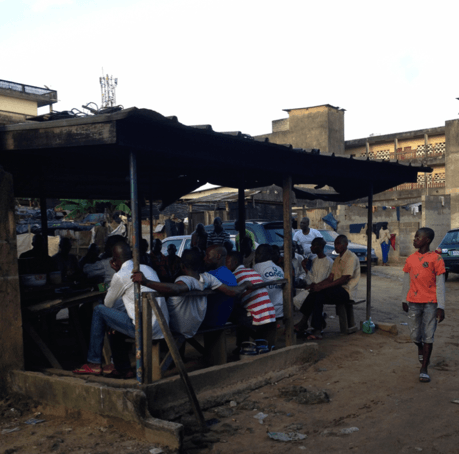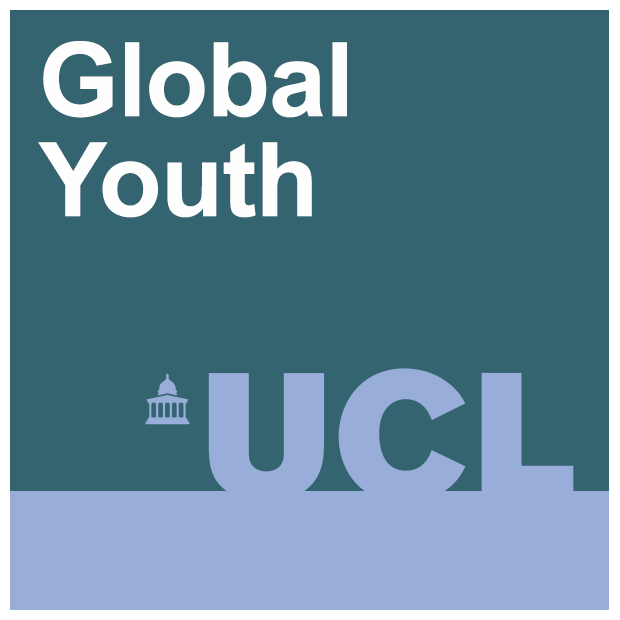The shifting roles of youth in post-conflict Cote d’Ivoire: the role of political discussion and intergenerational learning
By UCL Global Youth, on 5 May 2017
Posted by Dr Marika Tsolakis, ESRC Global Challenges Research Fund Postdoctoral Fellow

Côte d’Ivoire provides an important example of how youth and elders are navigating new realities in a post-conflict era through participation in community-based discussion groups called agoras and grins. These spaces helped to propel youth to the forefront of the country’s political crisis in the 1990s and 2000s and, alongside youth militias, facilitated the manipulation and instrumentalisation of youth in violent conflict.
My recent study of 38 agoras and grins included 118 observation hours and 30 in-depth interviews sheds some light on how youth and elders live and learn together in these spaces. In particular, I found that inter-generational activities can benefit both younger and older people and can contribute to reconstruction at a societal level. These findings suggest that ‘youth’ oriented peace projects should consider a multi-age approach.
Youth Identity in Local Political Discussion Groups
In 2010-2011, Côte d’Ivoire experienced four months of post-electoral violence that resulted in over 3,000 fatalities. This was the culmination of a decade of political divisions that cut across ethnic, religious and regional differences. Since 2011, attempts at peace and reconciliation have had varying levels of efficacy and youth violence has steadily increased.
A dynamic culture of public discussion and debate was cultivated over these tumultuous decades, through public discussion forums called agoras and grins. Agoras generally supported the former president Laurent Gbagbo, now on trial at the International Criminal Court, and at the height of the crisis each space amassed hundreds of people in vacant lots or squares to listen to speakers deliberate on political issues. Over 300 agoras (also known as parlements and Sorbonnes) sprang up during the crisis, and most met on a daily basis.
Grins, on the other hand, consisted of smaller familiar groupings, traditionally of men, who would discuss pressing issues during a three-cup tea ceremony. Members of these spaces generally supported then-opposition leader and current president Alassane Ouattara and often identified as Muslim, Northern Ivoirian, or/ of foreign origin. This demographic had suffered discrimination and suppression under the Gbagbo regime.
In both agoras and grins, young (predominantly male) people often eschewed tradition to become speakers and leaders, reflecting their newly enhanced agency as politically powerful actors.
Different age, different knowledge
My research found that agoras and grins remained relevant sites of intergenerational learning three years after the post-electoral crisis. Members of both groups acknowledged that each individual, regardless of age, contributed to a discussion space through life experience, religious devotion, profession or otherwise. One young male agora member reported that in their agora, ‘things weren’t done by age anymore,’ indicating a shift from prevalent societal norms.
Rather, members attributed ‘young’ knowledge to matters of technology (specifically on-the-job knowledge) and other skills, sometimes including literacy. In some cases, it also related to political insider information or analysis. On the other hand, elder knowledge generally consisted of life skills, religion, cultural values, and professional networks.
Youth, particularly in grins, sought discussion spaces with older members. Displaced from their families due to conflict or poverty, they desired contact with adults to ‘stay on track’ and to avoid veering towards new forms of violence and social exclusion.
We say what we want, but with manners
However, participants of all ages admitted to following certain age-based protocols. For example, youth could disagree with elders in debate, but it involved following delicate processes of ‘manners’ and politeness in arguing one’s point.
One grin member explained, ‘there are certain behaviours to have. In front of elders…. Me, for example who is 40 years old, won’t talk to someone who is 60 as if I was talking to my equal.’ This 40-year old was an elder to some, but to his seniors he still need to respect age-based hierarchical norms.
Elders, however, felt a responsibility to teach younger members with an attitude of care, love and respect. A Quranic school teacher who hosted a grin felt that learning could not happen in the absence of a loving environment, evoking concepts prevalent in critical pedagogy and dialogic education.
Creating Creative Leadership Solutions
In order to maintain this delicate age balance, agoras and grins found new ways to allocate leadership roles. A 28-year old male grin member explained that ‘for things to work,’ elders occupied a leadership board called the Council of Wise Men, whereas younger members held the more modern positions of President, Secretary and Treasurer.
I observed this creative strategy in a number of spaces and noted that it permitted youth leadership without devaluing older members’ contributions.
Intergenerational Approaches to Reconciliation
Many post-conflict projects in Côte d’Ivoire and beyond focus on youth empowerment and dialogue. However, this study illustrates that youth often place a high value on the opinions and knowledge of their older counterparts and actively seek out spaces of interaction in their daily life. Multigenerational approaches could not only appeal to younger participants but also facilitate a broader societal healing.
More so, elders in Côte d’Ivoire may not face the same social and economic vulnerabilities that youth do, especially in terms of fear of retaliation. Although the political crisis has abated, one participant explained that young people are ‘still scared,’ unlike old people who had not participated in violence or divisive speech that could invite retaliation or indictment. This fear was compounded by the wider political climate, in which peace and justice has not been accomplished by the current Ouattara regime. A perception of ‘two-speed justice’ and discrimination against ethnicities that traditionally supported Gbagbo has meant that some youth have hesitated from voicing opinions unfavourable to the government or associating with agoras.
However, this project found that intergenerational spaces of dialogue and learning can help to protect young people from further violence through mentorship and access to safety networks. Community-based projects such as these could thus be a useful model for other post-conflict settings to use to help to re-integrate youth after violence and political upheaval.
 Close
Close



